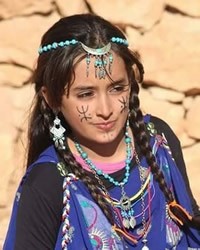The Shawiya are a part of various Berber groups that have risen in Algeria to defend their identity. In general, they are sturdy, thrifty, hospitable, and lovers of the soil. They are also proud, shrewd, persistent, and loyal. In particular a passion for independence is deeply ingrained in their culture and identity. The Berber refer to themselves as Imazighen, or "free and noble men."Arab Muslims conquered the Maghrib between 670 and 700 A.D. However, their influence was limited and the Shawiyas and other Berber tribes have managed to sustain and preserve their own language, culture, customs, and social organization. The Shawiya live mainly on the Aures Plateau of the Atlas Mountains in northern Algeria and Tunisia. The Africans call this entire region of North Africa Maghrib. The inaccessible peaks of the Atlas Mountains have long served as a refuge for the Berber peoples. These rugged mountains provided a base of resistance against the Romans, Vandals, Byzantines, and Arabs. The Shawiya Berbers live mainly in Algeria, but there is a large population in nearby Morocco as well as migrants in France, Italy, Germany, and Belgium.
Today, most Shawiya are shepherds and farmers. Their staple crops include grains and fruits that are cultivated in the mountains. Along the edge of the desert, they live as nomads, migrating between the highlands and the desert. They primarily raise sheep and goats, and most also have a few mules and donkeys, which are used for transportation. During the winter, they move their herds to the warm plains, then to higher pastures during the spring and summer months. Shawiya villages consist of close-knit, extended family groups, which trace their ancestry through male lineage. Many of the villages are located on the crests of hills. Although they move frequently, the Shawiya never leave the villages unattended. A few people stay behind to guard the granaries and to plant crops. Traditionally, Berber local government consisted of a jamaa (village council), which included all adult males and legislated according to local custom and law. Arab efforts to modify that system were not very successful, and it has since continued to function alongside the civil government imposed by the state.
Although they accepted Islam as a new religion, the Berber also maintained their pre-Islamic cultural and ritual traditions. The acceptance of Islam and the adoption of Arabic ways never completely erased Berber culture. Although they are nominally Sunni Muslims, most Shawiya have little knowledge of the practices of the Koran and other dimensions of Orthodox Islam. For example, Berber men often use verses from the Koran as part of their protective amulets. For historical reasons, Berbers are more likely to accept Christ than Arabs, who hold Islam as a central part of their identity.
Shawiya Berbers need the chance to put their identity in Jesus Christ and enjoy his blessings in this life and in the life to come.
Pray for Shawiya Berbers to put their faith and hope in Christ, paving the way for a Disciple Making Movement. Pray for a spiritual hunger among Shawiya Berbers that will lead them to the cross and the empty grave. Pray for workers to go to the Shawiya and find persons of people who will welcome them into their communities with the gospel of peace.
Scripture Prayers for the Berber, Shawiya in Morocco.
| Profile Source: Joshua Project |










